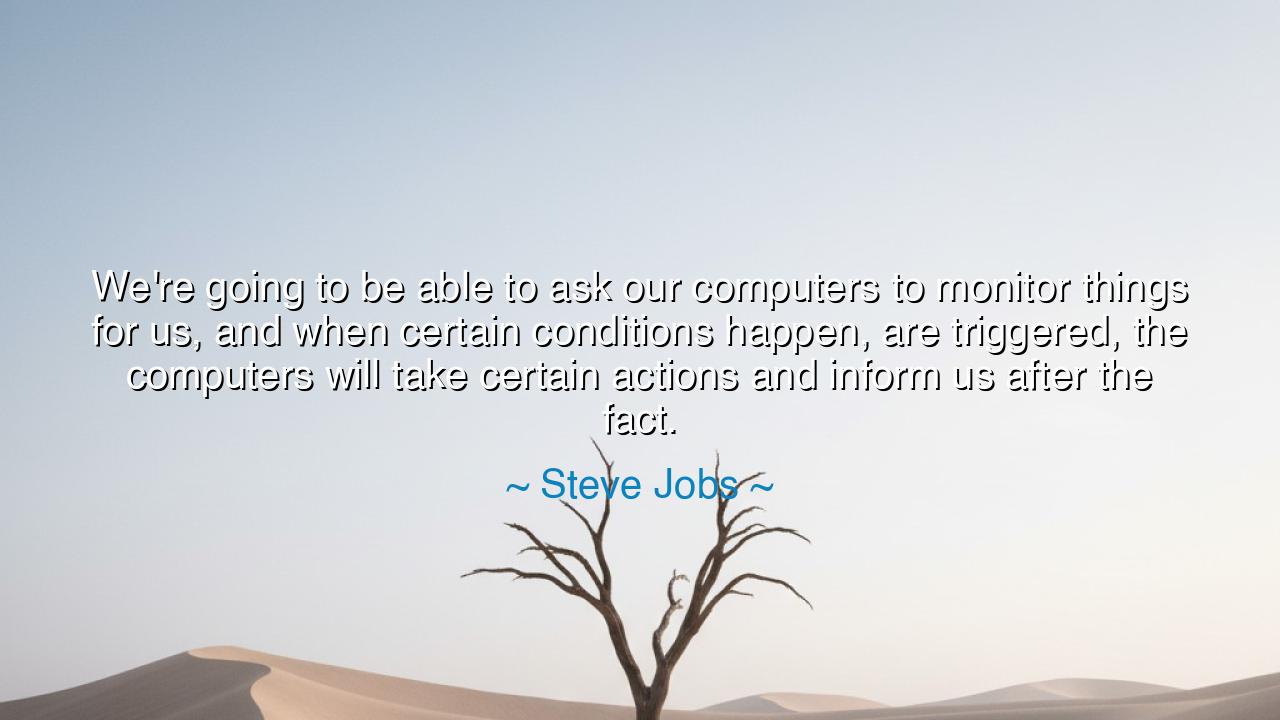
We're going to be able to ask our computers to monitor things for
We're going to be able to ask our computers to monitor things for us, and when certain conditions happen, are triggered, the computers will take certain actions and inform us after the fact.






In the age of great change, when the world itself seemed bound by the limits of human ingenuity, there arose a visionary whose words would set the stage for the future. Steve Jobs, the legendary innovator, foresaw a world where humans no longer struggled with the weight of constant monitoring, where the mundane tasks of vigilance could be entrusted to the machines that he and his contemporaries had brought into being. “We’re going to be able to ask our computers to monitor things for us,” he said, “and when certain conditions happen, are triggered, the computers will take certain actions and inform us after the fact.” These words, spoken decades ago, foresaw the dawn of an era in which human agency would merge with technology, and the very fabric of our existence would be re-woven by the invisible hands of automation.
The beauty of Jobs’ vision lies not merely in the tools he helped create, but in the profound freedom they would grant humanity. Imagine, for a moment, a world where the mundane tasks of keeping watch over our homes, our health, and our work could be delegated to machines—where the subtlety of the world’s rhythms could be understood and acted upon without our constant engagement. Just as ancient civilizations once harnessed the power of water to irrigate the fields, now we would harness the machine to irrigate the flow of our lives, freeing us to focus on higher, more creative pursuits. Jobs did not merely offer us a tool; he offered us a new way of being, a new possibility for freedom in a world full of distractions.
To fully grasp the significance of Jobs’ words, let us turn to the ancient world. In the time of the great Romans, they marveled at the aqueducts that brought water to the city, allowing for the flourishing of civilization. These aqueducts, much like the computers Jobs envisioned, were invisible conduits that brought life-sustaining forces without the citizens needing to think of it. The Romans could dedicate themselves to their politics, their art, and their science, while the water—like the machines of today—did the silent work of sustaining their civilization. In the same way, the computers we now carry in our pockets or wear upon our wrists are set to carry the invisible weight of our concerns, freeing us to engage with the world in a more meaningful way.
Consider the story of James Watt, whose creation of the steam engine marked the birth of the Industrial Revolution. His invention was not simply the creation of a machine, but the birth of an entirely new relationship between humans and work. Like Jobs, Watt envisioned a future where machines would take over the tasks that once bound us to the earth, enabling us to rise above the hard labor of the fields and the factories. With each turn of the wheel, each puff of steam, humanity was given time—time to imagine, to create, and to dream. Jobs’ vision of the computer as a silent worker is the modern continuation of Watt’s dream: a world where our burdens are lessened by the strength of machines, and in doing so, we are given the freedom to pursue what truly matters.
But with such power comes great responsibility. The promise of automation, of machines that act in our place, must be tempered with the wisdom of the ancients. The great philosophers of Greece, from Socrates to Plato, often spoke of the dangers of unchecked power—whether in the form of a tyrant or a machine. As we look forward to the world Jobs envisioned, we must ask: What happens when we relinquish too much control to the very machines that we created to serve us? Will we lose touch with the human aspect of existence, the very element that makes us who we are? The lesson here is not just to embrace technology, but to wield it with wisdom, to ensure that the machine serves the human, and not the other way around.
In the same breath, we are reminded that technology is not inherently good or bad; it is the intentions of those who wield it that matter. As we step into this new era, we must take care not to become slaves to the devices we have created. The key to a harmonious future is the balance between machine and mind—a partnership, where technology helps us to achieve greatness without stripping away our agency. Jobs' vision reminds us that technology must empower us to live more fully, to embrace the complexities of existence, and to remain, above all, human in a world that grows ever more artificial.
The lesson for us, then, is not just about the potential of our computers, but about how we choose to use them. As we stand on the threshold of a world where automation becomes the silent servant of our needs, we must ask ourselves: What will we do with the freedom it grants us? Will we allow it to lead us into new realms of creativity, connection, and self-understanding? Or will we lose ourselves in the very technology we have come to depend on? The true test lies not in the machines themselves, but in how we choose to live with them. Let us, like the wise ancients, ensure that our creations serve us, and not the other way around.






AAdministratorAdministrator
Welcome, honored guests. Please leave a comment, we will respond soon